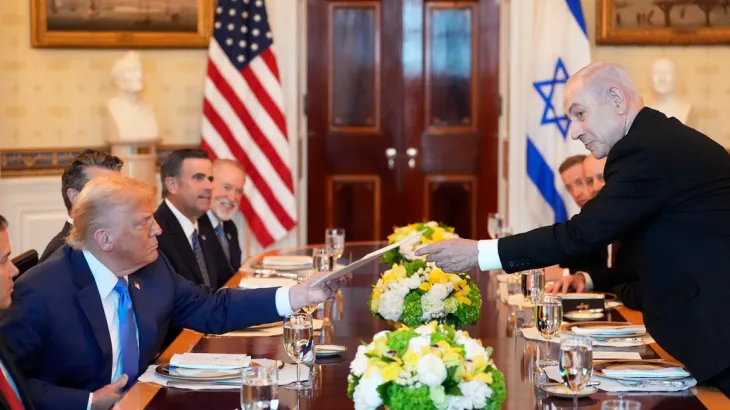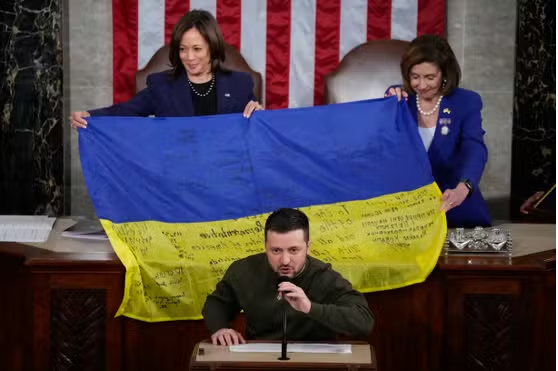
Last week, President Donald Trump was allegedly caught off guard when Israel initiated airstrikes in southern Syria, focusing on Damascus and Sweida, as well as on Gaza’s sole Catholic church—a strike that led to numerous civilian deaths. His reply, which includes a quick call to Prime Minister Benjamin Netanyahu, underscores the increasing rift within the White House over Israel’s aggressive military posture.
🪂 Unforeseen Attacks in Delicate Areas
In a statement described by White House Press Secretary Karoline Leavitt as “taken by surprise,” Trump learned of the Syrian airstrikes and Gaza church shelling only after they happened.
. The offensive in Damascus—targeting Syrian government and Druze locations—occurred during a fragile ceasefire facilitated by the U.S., Jordan, and Turkey.Meanwhile, a stray Israeli missile hit Gaza’s Holy Family Church, leading to the deaths of three civilians and igniting regional outrage.
In reply, Trump reached out to Netanyahu right away to “correct” these unforeseen actions—a strikingly open indication of disagreement between the partners.
🇺🇸 Washington’s Frustration Bubble
Irish U.S. officials are increasingly frustrated with Prime Minister Netanyahu, with some warning that his “trigger-happy” approach may endanger Trump’s carefully crafted regional strategy.
A senior U.S. official even described Netanyahu’s behavior as “madman”-like—an openly expressed criticism toward Israel that is uncommon.

The strain arises from Trump’s desire to direct the U.S. towards diplomacy and reducing tensions in the Middle East—particularly his support for Syrian President Ahmed al‑Sharaa after removing sanctions—and to guide the area towards an all-encompassing diplomatic resolution. Israeli attacks on Syrian government sites and the church in Gaza directly oppose these objectives.
🕊️ Diplomatic and Humanitarian Consequences
The Israeli airstrike operation endangers tenuous truces. The Syrian offensive intensified violence in Sweida province, where sectarian conflicts between Druze and Bedouin fighters had previously caused more than 1,200 fatalities. Israel’s involvement heightened instability in the area.
In Gaza, the attack on the church sparked international condemnation.
Netanyahu conveyed remorse to the Vatican, attributing the casualties to a misfired missile—yet, the damage to civilian buildings and holy places ignited significant outrage.
🧭 A Change in U.S.–Israel Relations
Trump’s reaction underscores an unusual instance of public disagreement with Israel. Though the two leaders have upheld steady strategic collaboration up to this point, this event shows increasing doubt within Trump’s foreign policy team—particularly among aides like his envoy to Syria, Tom Barrack, who questioned the timing and possible consequences of Israel’s actions.
This tension indicates that the strategies of Damascus and Gaza may increasingly oppose U.S. objectives, especially as Trump attempts to normalize ties with Syria and advance talks for a Gaza ceasefire. Israel’s independent military actions might jeopardize these initiatives and put Trump in a tricky diplomatic situation.
🔍 Can Trump Control Netanyahu Before Harm Escalates?
For Trump, the task is straightforward: maintain Israel as a crucial partner while stopping its preemptive actions from hindering his larger diplomatic efforts. His direct call to Netanyahu indicates a readiness to hold even close allies responsible when their actions conflict with U.S. policy goals.
However, strains persist. As Israeli military independence persists and U.S. officials express increasing frustration, Trump might be compelled to reassess the basis of the U.S.–Israel security partnership.
✅ Concluding Remarks
The events of last week—while tactical in essence—hold significant political implications. They illustrate how Israeli military strategies in Gaza and Syria currently challenge Trump’s leadership, compelling him to juggle regional involvement with global diplomacy. His direct challenge to Netanyahu regarding these strikes signifies a new stage in the alliance—characterized not just by unity, but also by strategic restraint and geopolitical responsibility.


